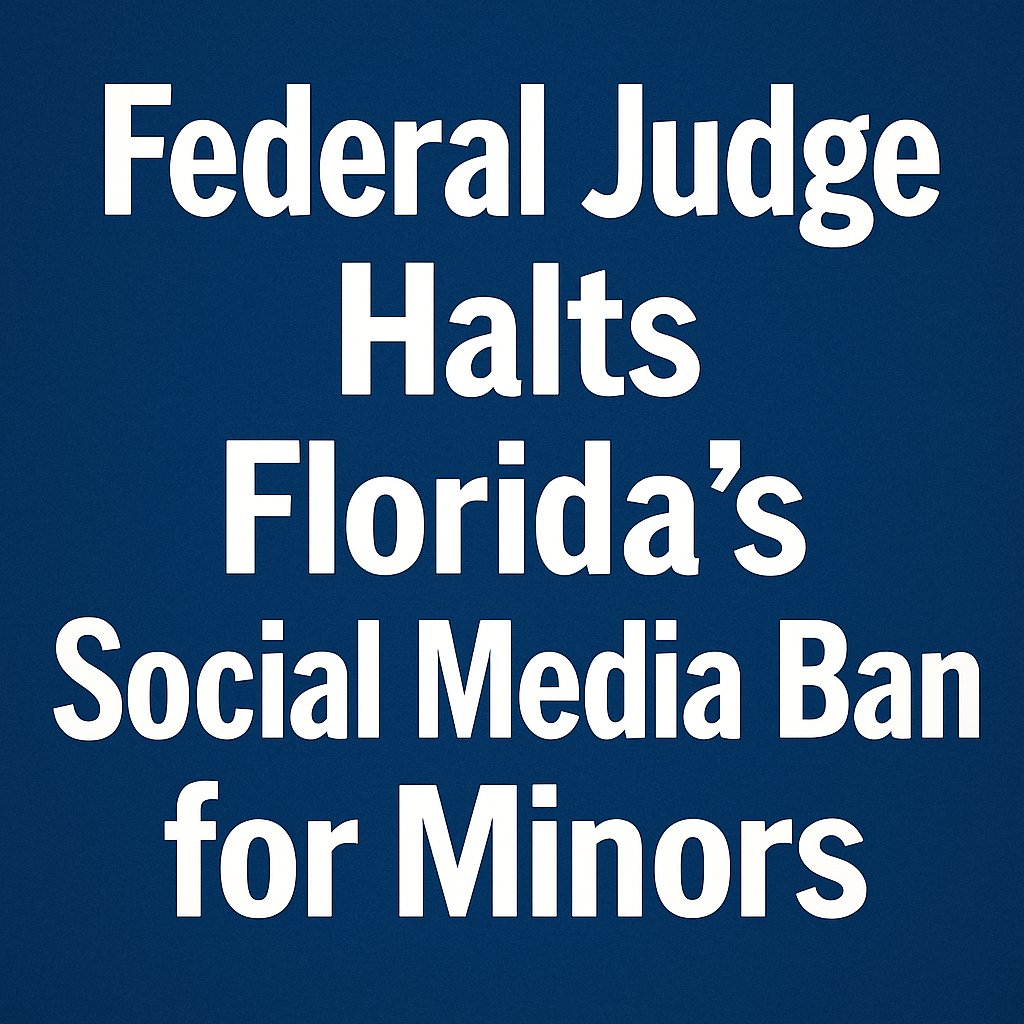Federal Judge Halts Florida’s Social Media Ban for Minors

A federal judge has issued a preliminary injunction preventing Florida state officials from enforcing a controversial law that would ban social media accounts for children. This decision comes as a response to a legal challenge concerning the constitutionality of the law, which was enacted by Governor Ron DeSantis in 2024.
Background on the Law
The Florida law sought to impose one of the most restrictive frameworks in the United States pertaining to minors’ access to social media. Specifically, it would prohibit children under the age of 14 from creating accounts on popular platforms such as TikTok, Instagram, and Snapchat. Furthermore, it mandated that children aged 14 and 15 must obtain parental consent to use these platforms. Such measures reflect a growing concern among lawmakers and parents regarding the impact of social media on youth mental health.
Judicial Ruling
U.S. District Judge Mark Walker delivered a decisive ruling on Tuesday, asserting that the law is “likely unconstitutional”. In his written order, Walker emphasized that the law places an undue burden on the rights of minors to engage in and access speech. Highlighting the tension between safeguarding children and protecting free speech, he stated that the prohibition directly impairs the ability of youths to participate in digital discourse.
Concerns Raised by Advocates
Walker’s ruling followed a request for preliminary relief from industry groups Computer & Communications Industry Association (CCIA) and NetChoice, who argue that the law unfairly restricts minors’ rights to access lawful content online. CCIA President and CEO Matt Schruers remarked on the ruling, stating, “This ruling vindicates our argument that Florida’s statute violates the First Amendment by blocking and restricting minors — and likely adults as well — from using certain websites to view lawful content.” Schruers expressed hope that this decision will lead to a permanent injunction against the statute.
Florida’s Position
A spokesperson for Florida Attorney General James Uthmeier defended the legislative intent behind the law, asserting that it was designed to protect children from the detrimental effects of social media, which proponents claim contribute to rising rates of anxiety and depression among youth. “Florida parents voted through their elected representatives for a law protecting kids from the harmful impacts of social media,” press secretary Jae Williams commented.
Related Legal Challenges in Other States
On the same day as Florida’s ruling, a related case was being heard in Atlanta regarding a Georgia law set to take effect July 1, 2024. This law also aims to implement age verification measures for social media accounts and requires parental consent for minors under the age of 16. Similar to the Florida law, industry representatives, including those from NetChoice, allege that Georgia’s regulations impede free speech and impose unfair barriers on young users.
During the court proceedings in Atlanta, Judge Amy Totenberg expressed skepticism regarding the law’s constitutionality, hinting at the potential precedent set by rulings against similar laws in other jurisdictions. NetChoice attorney Jeremy Maltz articulated the concerns, suggesting that Georgia’s age verification requirements would impose significant hurdles for minors wishing to express themselves online.
Legal Foundations of Free Speech for Minors
The legal arguments surrounding these cases hinge on interpretations of First Amendment rights. Under United States law, minors have been recognized as having limited rights to free speech, but the extent of those rights is often debated in court. Expert legal opinions have suggested that laws aimed at restricting minors’ access to digital platforms often verge on infringing their constitutional rights, which complicates matters for lawmakers attempting to craft regulations that ensure child safety.
The Broader Picture: Social Media and Youth Mental Health
The ongoing discussions around these laws also intersect with broader societal concerns regarding the effects of social media on young people. Numerous studies have linked frequent social media usage with adverse mental health outcomes, including anxiety, depression, and loneliness. Supporters of limitations on social media access for minors argue these restrictions are necessary to address these public health concerns effectively. The challenge remains in balancing child protection with the right to free expression.
Conclusion
The judicial scrutiny of Florida’s and Georgia’s proposed laws signals a critical juncture in the ongoing debate over social media regulations for minors. As various state legislatures consider similar measures, the outcomes of these legal challenges may lead to significant precedents that affect both lawmakers’ ability to regulate online spaces and the rights of minors in the digital age. The interplay between youth safety and free expression will remain a pivotal issue as courts continue to evaluate these conflicting interests.
Source: fortune